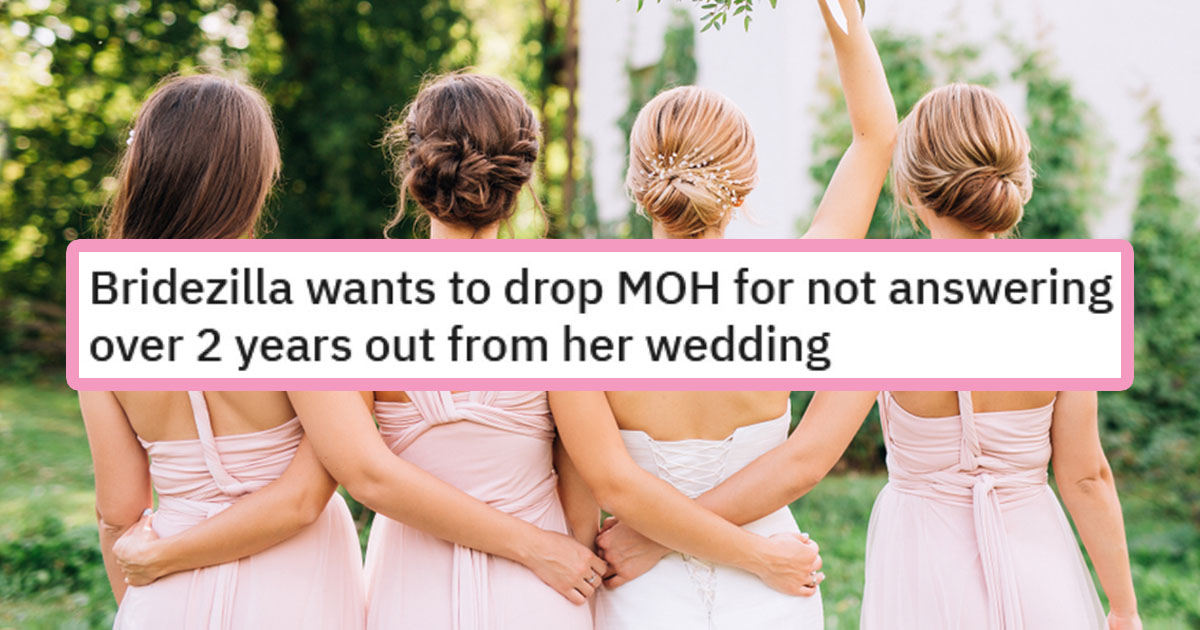
How to say no to being bridesmaid maid of honor wedding? Navigating wedding requests can be tricky, especially when close friends or family ask you to be a bridesmaid or maid of honor. This guide explores the social pressures, different ways to decline gracefully, and strategies for maintaining relationships while setting healthy boundaries.
This post will cover everything from understanding the underlying reasons for feeling pressured to accept, to crafting the perfect polite refusal, and even managing the aftermath. We’ll tackle various situations, from close friends to family members and significant others, offering practical advice and templates to help you navigate these delicate social situations with confidence and ease.
Understanding the Request
The pressure to accept a bridesmaid or maid of honor role often stems from a potent mix of social expectations and personal connections. This pressure can be especially strong in close-knit friend groups or within families where traditions and expectations are deeply ingrained. Navigating these requests requires a keen understanding of the underlying motivations and the various ways individuals might respond to such invitations.
Social Pressures Surrounding the Roles
Society often portrays the bridesmaid/maid of honor roles as essential components of a wedding celebration. This perception can lead to feelings of obligation and pressure, especially for those close to the bride. The roles are often seen as a demonstration of support and friendship, creating a social expectation that acceptance is the norm. This can manifest in subtle cues, such as comments from friends or family, or more direct requests from the bride.
Examples of Pressure Situations, How to say no to being bridesmaid maid of honor wedding
A close friend might feel obligated to be a bridesmaid due to their long-standing relationship with the bride. Similarly, a family member might feel pressured to accept a role because of their familial connection. Another situation could involve a bride who emphasizes the importance of the role in the wedding ceremony and requests a particular friend or family member to be a part of it.
Saying no to being a bridesmaid or maid of honor can be tough, especially when you’re close to the bride. But sometimes, your well-being needs to come first. Focusing on your overall health, including what you eat, can be crucial. For example, consider how your diet impacts your menstrual cycle; eating to support your menstrual cycle is a great way to ensure you’re prioritizing your body’s needs.
Ultimately, setting boundaries and saying no to these commitments is about prioritizing your own happiness and health, and that’s completely valid.
This creates a scenario where the individual feels obligated to participate even if they don’t feel comfortable or able to do so.
Personality Types and Reactions
Individuals with strong social needs might be more inclined to accept the role to maintain their social standing or relationships. Conversely, individuals with a strong sense of independence might resist the pressure and decline the role. Introverted individuals might feel overwhelmed by the public nature of the role, while extroverts might feel comfortable accepting it. A person who prioritizes their own well-being may decline the role to avoid additional stress or commitments.
Different personality types will react differently to the social pressure, and understanding these variations is crucial in navigating the decision.
Potential for Conflict if Declined
Declining a bridesmaid/maid of honor role can sometimes lead to strained relationships with the bride and other close friends or family members. This is particularly true in situations where the role is seen as a significant expression of support. A perceived slight or lack of commitment can cause discomfort or hurt feelings, potentially affecting future relationships. However, a respectful and honest explanation of the reasons for declining the role can help mitigate these potential conflicts.
Common Reasons for Declining the Role
Understanding the reasons for declining the role is essential for both the individual declining and the bride. A clear understanding of the motivations behind the decision can help the individual feel more comfortable in their decision. Here are some common reasons why someone might decline:
- Time Constraints: The individual may have pre-existing commitments or other obligations that make it difficult to dedicate the time and energy required for the role.
- Financial Constraints: The role might involve significant financial costs that the individual cannot afford.
- Personal Circumstances: The individual may be dealing with personal issues or events that make it challenging to commit to the role.
- Lack of Interest: The individual may not feel enthusiastic about the role or the wedding itself.
- Previous Obligations: The individual might have other prior commitments that conflict with the role.
- Concerns about Logistics: The individual may have logistical issues that prevent them from fulfilling the role adequately, such as geographical distance or scheduling conflicts.
Crafting a Polite Decline
Saying no to being a bridesmaid or maid of honor can be tricky, but it’s crucial to do it gracefully. A heartfelt and respectful refusal is key to maintaining a positive relationship with the bride-to-be and other members of the wedding party. This section will provide various ways to decline the request without causing any hurt feelings.Saying no is not a reflection on your friendship with the bride.
It’s about honoring your own needs and circumstances. A clear and thoughtful explanation, delivered with kindness, is essential.
Different Ways to Decline
Saying no can be done in person, over the phone, or via email. The best approach depends on your comfort level and the relationship you have with the bride. Consider the bride’s personality and your own comfort level to choose the best method.
- In Person: This method allows for immediate clarification and the opportunity to offer alternatives. Choose a private and comfortable setting for the conversation, such as a coffee shop or a quiet corner of the house.
- Over the Phone: A phone call is suitable for those who prefer a less formal setting or are not comfortable with a lengthy conversation in person. Prepare your response beforehand and maintain a pleasant tone.
- Via Email: An email allows you to carefully craft your response and avoids the pressure of an immediate interaction. This is ideal for those who prefer to express themselves in writing.
Phrasing a Respectful Refusal
Crafting the perfect refusal requires empathy and tact. Focus on expressing gratitude for the honor while stating your reasons politely. Avoid making excuses or implying that you are not a good friend.
- Express Gratitude: Begin by acknowledging the invitation and expressing your appreciation for being considered. For example, “Thank you so much for thinking of me for [maid of honor/bridesmaid]. It means a lot to me that you would consider me.”
- State Your Reason(s): Clearly and concisely explain why you cannot accept the role. Be honest but avoid negativity. For example, “I’m truly honored by the invitation, but I won’t be able to commit to the time commitment required for the role at this time.” or “I am so happy for you and so grateful you asked me, but my schedule won’t allow me to take on the responsibilities involved.”
- Offer Alternatives: Consider proposing an alternative role if possible. This shows your willingness to support the wedding in another way. For example, “I’d love to help in other ways, perhaps by organizing the bachelorette party, or assisting with the reception planning.”
- Maintain a Positive Tone: Express enthusiasm for the wedding and maintain a friendly and positive tone throughout your message. For example, “I’m so excited for you and your wedding! I hope you have the best day.” or “I am so happy for you! I’m sure it will be amazing, and I’d love to be there to support you in other ways.”
Alternative Roles
Instead of being a bridesmaid or maid of honor, you can offer other ways to support the bride. These roles often carry less responsibility and allow you to participate in the festivities without being the primary point of support.
- Bachelorette Party Planner: Taking charge of organizing the bachelorette party allows you to contribute without the time commitment of a bridesmaid or maid of honor role.
- Reception Helper: Helping with the reception setup or organization is another option that allows you to be involved without being a bridesmaid or maid of honor.
- Guest Coordinator: Helping to coordinate guests or other logistics is another option that allows you to contribute without being a bridesmaid or maid of honor.
Sample Email Template
Subject: Re: [Bride’s Name]’s WeddingDear [Bride’s Name],Thank you so much for asking me to be your [maid of honor/bridesmaid]. It means a lot to me that you would consider me. I’m so incredibly happy for you and your upcoming wedding!Unfortunately, due to [brief, honest reason, e.g., conflicting commitments/personal circumstances], I won’t be able to commit to the responsibilities of being a [maid of honor/bridesmaid].
I would love to help in other ways, perhaps by organizing the bachelorette party or assisting with the reception planning.Please know that I’m incredibly excited for you and wish you all the best.Warmly,[Your Name]
Addressing Specific Situations

Declining a bridesmaid or maid of honor request can be tricky, especially when it involves close friends and family. Understanding the nuances of different situations is crucial for crafting a respectful and effective response. This section will delve into common reasons for declining, how to handle close relationships, and strategies for navigating various scenarios.
Common Reasons for Declining
Many factors can influence your decision to decline. A packed schedule, financial constraints, or existing personal commitments are all valid reasons. Consider your current obligations and priorities when evaluating the request. For instance, a demanding job, a significant personal event, or simply not feeling up to the commitment are all understandable justifications.
Handling Requests from Close Friends and Family
When the request comes from a close friend or family member, the conversation becomes more delicate. Maintain a respectful tone and avoid making assumptions about their feelings. Emphasize your appreciation for the honor while clearly stating your reasons for declining. It’s essential to be direct but kind. For example, “I’m so touched that you’d ask me, but I’ve already committed to other things around that time.”
Addressing Potential Hurt Feelings
It’s natural for the person requesting you to feel hurt. Acknowledge their feelings and express empathy. Use phrases like, “I’m so sorry if this is disappointing,” or “I’m truly sorry, but I can’t commit to being a bridesmaid.” Avoid making excuses or downplaying your decision. Focus on the positive aspects of your relationship. For example, “I’m still so excited for you and your wedding!” A heartfelt apology is often helpful, as it demonstrates your understanding of the potential emotional impact of your decision.
Dealing with Significant Other’s Friends or Family
Declining a request from a significant other’s friend or family member requires extra tact. Explain your decision clearly but gently, focusing on your personal reasons rather than their relationship. For example, “I’m honored you asked, but my schedule is just too full at that time.” You should avoid placing blame or making it seem as though you are rejecting their relationship.
Keep the conversation focused on your limitations, rather than their request.
Navigating a Close Friend’s Wedding
Declining a bridesmaid or maid of honor request from a close friend requires a balance of empathy and clarity. Highlight the importance of your friendship while acknowledging the time commitment involved. For example, “I love you and your wedding and want to celebrate with you, but I can’t commit to the role.” This situation requires more care than a request from someone you don’t know as well.
Emphasize that your friendship remains unaffected by your decision. Reiterate that you will be there to support your friend on their special day.
Strategies for Saying No: How To Say No To Being Bridesmaid Maid Of Honor Wedding
Saying no to being a bridesmaid or maid of honor can be tricky, but it’s crucial to prioritize your own well-being and commitments. This often involves navigating delicate social situations while maintaining your integrity. This section will explore strategies for crafting a respectful and confident refusal.Understanding your reasons for declining, setting boundaries, and providing alternative suggestions will all contribute to a smooth and less stressful experience for everyone involved.
Declining a bridesmaid or maid of honor role can be tricky, but it’s totally okay! Sometimes, your schedule or other commitments just don’t align. For example, you might be attending the exciting miu miu literary club milan design week , which sounds like a blast. Ultimately, be polite, honest, and let the bride know you’re happy for her but can’t commit.
Saying no is empowering, and it frees you to enjoy your own life.
These strategies are about assertiveness, not rudeness. They allow you to maintain healthy relationships while honoring your own needs.
Considering Your Reasons for Saying No
Declining an invitation requires introspection. Identify the core reasons behind your decision. Is it a scheduling conflict, a lack of desire to be involved, or a personal preference? Recognizing these underlying motivations will help you articulate your response effectively and honestly. It also allows you to clearly define your boundaries.
This process helps you understand what you’re willing to do and what you’re not. The more clarity you have, the smoother the conversation will be.
Setting Boundaries in Social Situations
Setting boundaries in social situations is vital. It’s about recognizing and respecting your own limitations. This doesn’t mean being rude; it’s about communicating your needs effectively. When faced with a request, take a moment to consider your commitments and preferences before responding. Be prepared with a polite but firm “no.” This demonstrates respect for yourself and the other person involved.
For example, if you’re already heavily committed to other events, scheduling conflicts, or personal preferences, you’ll need to state these in a clear but respectful manner.
Alternative Commitments or Activities
If the invitation is accepted, it’s helpful to suggest alternative commitments or activities. This demonstrates that you value the relationship and want to participate in some way, even if it’s not in the specific role requested. For instance, offering to help with the wedding planning, such as organizing the guest list or overseeing decorations, is a valuable alternative.
Alternatively, you could suggest coordinating a brunch or a small gathering after the ceremony to celebrate with the couple. Consider these options thoughtfully; they are often more than acceptable.
Honesty in Declining
Being honest about your reasons for declining is essential. This builds trust and maintains respect in your relationships. Avoid vague or evasive responses. Be straightforward and respectful in your communication. This is not a time to make excuses or offer false reasons.
Honesty will ultimately create a stronger and more transparent relationship.
Explaining Your Reasons Without Hurt or Defensiveness
Explain your reasons for declining without being hurtful or defensive. Focus on your own commitments and preferences. Use “I” statements to express your perspective, for example, “I’m so sorry, but I have other prior commitments that I can’t reschedule.” This approach avoids blaming the other person and fosters a respectful dialogue. Maintain a calm and understanding tone.
Remember, it’s not about being perfect, but about being honest and respectful.
Managing the Aftermath
Declining a bridesmaid or maid of honor role can sometimes feel like treading on eggshells. While your decision is ultimately your own, the aftermath can be tricky to navigate. Handling potential awkwardness and maintaining relationships requires tact and sensitivity. This section provides strategies to smooth the transition and prevent any lingering tension.
Addressing Potential Awkwardness
The bride and other wedding attendees might react differently to your decision. Some might express disappointment, while others might remain neutral. Understanding these potential reactions helps you prepare for the possible responses and develop strategies for effective communication. Maintaining a calm and respectful demeanor is crucial, as this sets the tone for how the situation is handled.
Maintaining Relationships
Maintaining relationships with the bride and other guests is essential. Your actions and words in the aftermath will shape how this situation is perceived. A polite and considerate approach can help prevent misunderstandings and foster continued positive relationships. Expressing gratitude for the offer, even while declining, is a thoughtful way to acknowledge the gesture.
Avoiding Further Conflict
Avoiding further conflict requires clear communication and proactive steps. Avoiding gossip and speculation about your reasons for declining is important. Keep the conversation focused on the positive aspects of the wedding and your support for the bride’s happiness. Avoid making your reasons for declining too personal or lengthy. Be concise and respectful in your explanations.
Addressing Perceived Slights or Hurt Feelings
If hurt feelings or perceived slights arise, addressing them directly and calmly is important. Actively listening to the bride or other guests’ concerns is crucial to understanding their perspective. Acknowledge their feelings without taking responsibility for their reactions. Emphasize your support for the wedding and your desire to remain a friend or part of the social circle.
Potential Issues and Solutions
Potential issues after declining may include the bride or other guests feeling excluded or slighted. A heartfelt message expressing your continued support for the wedding can help alleviate these concerns. Offering alternative ways to contribute, like helping with specific tasks or offering support outside of the formal role, can show your commitment to the wedding festivities. For example, if you’re not comfortable being a bridesmaid but want to be involved, suggest helping with decorations or gifts.
Declining a bridesmaid or maid of honor role can be tricky, but it’s totally okay to politely say no if it feels overwhelming. Sometimes, commitments clash, or maybe you’re just not feeling the pressure. For example, a recent photoshoot featuring Jacob Elordi as Heathcliff, alongside Emerald Fennell in the Wuthering Heights adaptation ( first glimpse jacob elordi heathcliff emerald fennell wuthering heights ) might be a fantastic distraction while you craft your thoughtful, yet firm, response.
Ultimately, honoring your own needs and boundaries is key when faced with wedding requests.
If the bride mentions being disappointed, acknowledge her feelings with a simple, empathetic statement like, “I understand your disappointment, but I wanted to let you know I’m still very much looking forward to the wedding.”
Beyond the Immediate Request

Saying no to being a bridesmaid or maid of honor is a personal decision, but it doesn’t have to strain your relationship with the bride. It’s crucial to prepare for future wedding-related requests, whether it’s a bridal shower, bachelorette party, or another event, by establishing clear boundaries. This proactive approach will help you maintain healthy relationships and avoid feeling pressured or resentful.Planning ahead is key to managing future requests gracefully and effectively.
It’s not about avoiding weddings entirely; it’s about setting healthy limits and ensuring your well-being is prioritized. This proactive approach allows you to address potential social obligations with confidence and clarity.
Handling Future Wedding Invitations
Setting clear expectations early on prevents misunderstandings. If you’ve declined a bridesmaid role, future invitations for other events related to the wedding should be approached with the same polite but firm approach. You can mention your prior commitment to other obligations.
Setting Healthy Boundaries
Establishing clear boundaries about wedding-related activities is vital. This isn’t about being unfriendly; it’s about prioritizing your well-being. Consider how much time and energy you can realistically dedicate to wedding events, and communicate this to friends and family.
- Communicate your limits: Be upfront about your availability and commitments. For example, you might say, “While I appreciate the invitation, I’ve already committed to another event that weekend.” This directness avoids any misinterpretations.
- Suggest alternatives: If you can’t attend every event, offer to help in other ways. “I’d love to help with the gift registry; I’m free to assist with that.” This demonstrates your support without overcommitting.
- Be prepared for questions: Anticipate questions and have thoughtful responses ready. For instance, “I’ve enjoyed my time with you and I’m so happy to see your happiness. I’m sure I’ll be able to celebrate with you in the future.” This shows respect without overcommitting.
Navigating Other Social Obligations
Managing your social life alongside wedding-related requests requires careful planning. Juggling commitments and maintaining relationships requires conscious effort. It’s about prioritizing your needs while still supporting your friends and family.
- Prioritize commitments: Consider your existing obligations and commitments. If you’ve already accepted a role in a friend’s project, you might need to be firm about your attendance at the wedding-related events.
- Schedule proactively: Plan your time and commitments to avoid conflicts. Having a clear calendar helps you manage expectations and prevent overbooking.
- Communicate proactively: Discuss your commitments with your friends and family to ensure everyone understands your boundaries.
Comparing and Contrasting Management Strategies
Different approaches to handling future wedding-related requests will have varying results. The key is to remain consistent in your approach, respecting your boundaries while maintaining positive relationships.
| Strategy | Pros | Cons |
|---|---|---|
| Direct and firm declination | Clear and concise communication | May seem abrupt to some |
| Offering alternative assistance | Maintains a positive relationship | Can be time-consuming to organize |
| Scheduling proactively | Avoids conflicts and overcommitments | Requires more planning and organization |
Maintaining Positive Relationships
Respect and consideration are key to maintaining positive relationships, even when declining requests. It’s about finding a balance between being true to yourself and being supportive of others.
“Honesty is the best policy”
This classic advice is crucial in handling future requests. Be honest about your limitations, and explain your reasons calmly and respectfully. This will prevent misunderstandings and ensure everyone feels valued.
Example Scenarios
Navigating the delicate dance of declining a bridesmaid or maid of honor request requires understanding the nuances of each situation. A thoughtful approach, combined with clear communication, can maintain strong relationships while honoring your own needs and boundaries. This section explores various scenarios and potential responses, equipping you with the tools to handle these situations gracefully.
Comparing Scenarios of Declining a Request
Declining a bridesmaid or maid of honor request requires careful consideration of the relationship dynamics, personal commitments, and the bride’s expectations. Different scenarios call for different approaches.
| Scenario | Relationship Dynamics | Personal Commitments | Bride’s Expectations | Potential Response |
|---|---|---|---|---|
| Close Friend, but Tight Schedule | Deep bond, frequent social interaction | Extensive travel plans, demanding work schedule | Strong expectation for a close friend to be in the wedding party | “I’m so sorry, but I have a very busy schedule with work and travel plans around that time. I’d love to support you in other ways.” |
| Family Member, but Limited Availability | Family ties, occasional interaction | Prior family commitments, health concerns | Strong desire for family involvement in the wedding | “Thank you so much for thinking of me. I’d love to help in other ways, perhaps by [suggesting a specific task].” |
| New Friend, but Unfamiliar With Wedding Details | Casual friendship, infrequent interaction | No prior commitments | General expectation of close friends in the wedding party | “I’m so flattered you’d ask me. I’m still getting to know everything about the wedding, and I’m not sure if my schedule will allow for the time commitment.” |
| Long-Distance Friend | Strong bond, limited in-person interaction | Limited time to travel, financial constraints | Expectation of support and presence in the wedding | “Thank you for thinking of me. I’d love to support you in other ways from afar, perhaps by [suggesting a specific task].” |
Responses to a Bridesmaid/Maid of Honor Request
This table Artikels various responses to a bridesmaid/maid of honor request, highlighting the reasons behind each response.
| Request | Potential Response | Reason for Response |
|---|---|---|
| “Would you be my bridesmaid?” | “Thank you so much for asking! I’m honored, but I’m not able to commit to the role at this time.” | Acknowledges the honor, but declines due to personal circumstances. |
| “Would you be my maid of honor?” | “I’m so touched you’d ask me. Unfortunately, my schedule is very full that weekend, and I won’t be able to make the commitment.” | Expresses appreciation, but points to scheduling constraints. |
| “Would you be my bridesmaid?” | “I’d love to be involved in the wedding, but my schedule doesn’t allow me to be a bridesmaid.” | Indicates a desire to be involved, but not in that specific role. |
| “Would you be my maid of honor?” | “I appreciate you thinking of me, but I’m not able to commit to this role.” | Expresses gratitude and politely declines. |
Declining the Request and Impact on the Relationship
Different ways to decline a request can impact the relationship with the bride. Choosing a tactful approach is key to maintaining a positive connection.
| Decline Method | Potential Impact on Relationship |
|---|---|
| Vague/Non-committal | May leave the bride feeling unsure or disappointed. May lead to future misunderstandings. |
| Direct and Polite | Preserves the relationship while honoring personal commitments. |
| Offering an Alternative | Shows consideration and a desire to support the bride in other ways. |
| Explaining Personal Circumstances | Builds trust and understanding. Demonstrates honesty and transparency. |
Consequences of Saying Yes or No
The decision to accept or decline a bridesmaid/maid of honor request has potential consequences.
| Decision | Potential Consequences |
|---|---|
| Saying Yes | Potential strain on personal commitments, financial burdens, emotional stress. |
| Saying Yes, but struggling to meet the commitments | Potential conflict with the bride and other bridesmaids, disappointment and resentment |
| Saying No | May disappoint the bride, but preserves personal well-being and relationships. |
| Saying No, but explaining the reason clearly | Maintaining a positive relationship while honoring personal commitments. |
Benefits and Drawbacks of Different Decline Methods
Choosing the right method to decline a bridesmaid/maid of honor request can significantly impact the relationship with the bride.
| Decline Method | Benefits | Drawbacks |
|---|---|---|
| Direct and Polite | Preserves the relationship. | May not be as emotionally fulfilling for the bride. |
| Offering Alternatives | Shows consideration, allows support. | May not fully address the bride’s desire for a specific role. |
| Explaining Personal Circumstances | Builds trust and transparency. | May feel overly detailed for some situations. |
Final Review
Ultimately, saying no to being a bridesmaid or maid of honor is a personal decision. This guide empowers you to understand the nuances of these requests, craft a respectful refusal, and maintain positive relationships with everyone involved. Remember, setting healthy boundaries is crucial, and you deserve to prioritize your own needs and commitments.





